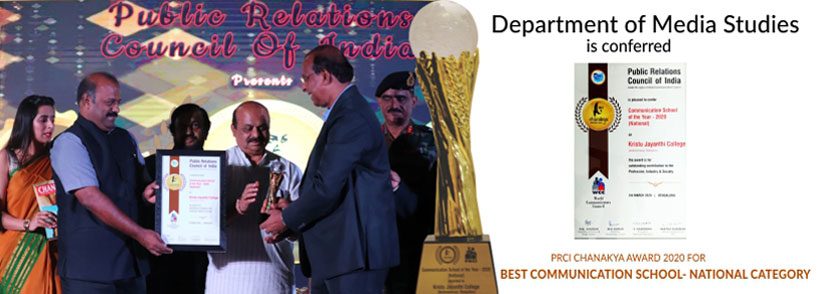
MA Media and Communication
Programme Overview
The MA Media and Communication programme at Kristu Jayanti University is a research-driven, innovation-focused postgraduate degree that integrates advanced theoretical inquiry with creative media production. Across two years, students engage with contemporary media theories, rigorous academic research, and cross-platform content creation, fostering the ability to critically evaluate media narratives and design effective communication strategies. The programme places strong emphasis on innovation—encouraging students to develop original ideas, experiment with emerging technologies, and explore new storytelling paradigms across journalism, filmmaking, digital media, advertising and corporate and strategic communication. Graduates emerge as analytical and future-ready media professionals, equipped with a strong research foundation, an industry-oriented portfolio, and the strategic acumen to lead and innovate within the global media ecosystem.
Eligibility Criteria Candidates with any Bachelor’s degree and with a minimum of 50% marks (45% for SC/ ST candidates) from a recognised University are eligible.
Why Opt for This Course?
This programme stands out as a perfect blend of creativity, technology, and research-driven media education, designed for learners who want to excel in modern media industries.
What Sets This Course Apart?
- Research-Centric Learning
- Innovation and Creative Experimentation
- Advanced Production Ecosystem
- Expert Mentorship and Interdisciplinary Exposure
- Industry and Academic Networking
- Structured Internship Experience
What Will You Learn?
- Multi-Media Productions
- Media Research and Analysis
- Copywriting and Visualising
- Digital Film Making
- Strategic and Marketing Communication
- Photography
- Data Visualization
Course Modules
- Reporting Methods
- Editing and Print Design
- Communication Theories
- Media Law and Ethics
- Photojournalism
- Data Visualisation
- Advertising Design
- Integrated Marketing Communication
- Film Aesthetics
- Audio Visual Programme Production
- Media Psychology
- Corporate Communication
- Business Journalism / Storyboarding
- Copywriting & Visualisation
- Technical Writing
- Development Communication
- Branding and Visual Identity
- Sports Journalism / Film Direction

